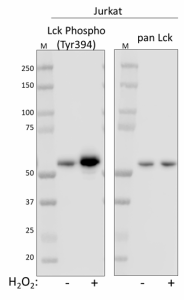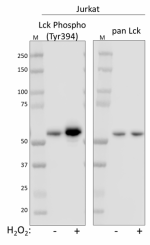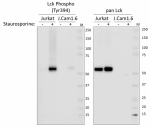- Clone
- LCK-01; A18002D;
- Regulatory Status
- RUO
- Other Names
- LSK; 56lck; LCK Proto-Oncogene, Src Family Tyrosine Kinase; p56LCK; Pp58Lck T Cell-Specific Protein Tyrosine Kinase

-

Whole cell extracts (15 µg protein) from serum starved Jurkat cells untreated (-) or treated (+) with 5 mM H2O2 for 3 minutes were resolved on a 4-12% Bis-Tris gel, transferred to a PVDF membrane, and probed with 0.25 µg/mL (1:2500 dilution) of purified anti-Lck Phospho (Tyr394) antibody (clone A18002D) for 2 hours at room temperature. Proteins were visualized by chemiluminescence detection using HRP goat anti-mouse IgG antibody (Cat. No. 405306) at a 1:3000 dilution. Equal Lck loading was confirmed by probing membranes with purified anti-Lck antibody (clone LCK-01) at 1.0 µg/mL (1:500 dilution). Lane M: Molecular weight marker. -

Whole cell extracts (15 µg protein) from Jurkat and J.Cam1.6 cells untreated (-) or treated (+) with 1 µM staurosporine for 3 hours were resolved on a 4-12% Bis-Tris gel, transferred to a PVDF membrane, and probed with 0.25 µg/mL (1:2500 dilution) of purified anti-Lck Phospho (Tyr394) antibody (clone A18002D) for 2 hours at room temperature. Proteins were visualized by chemiluminescence detection using HRP goat anti-mouse IgG antibody (Cat. No. 405306) at a 1:3000 dilution. Equal Lck loading was confirmed by probing membranes with purified anti-Lck antibody (clone LCK-01) at 1.0 µg/mL (1:500 dilution). Lane M: Molecular weight marker.
| Cat # | Size | Price | Quantity Check Availability | ||
|---|---|---|---|---|---|
| 699954 | 1 kit | $183.00 | |||
The Src family tyrosine kinase p56Lck (Lck) is a non-receptor tyrosine kinase that plays a critical role in T cell selection and maturation within the thymus, and also in the function of mature T cells. Lck, which is constitutively bound to cytosolic domains of CD4 and CD8 surface receptors, plays an essential role in T cell receptor (TCR) signaling. Engagement of the TCR with peptide antigen-loaded MHC complexes results in the recruitment of CD4- and CD8-bound Lck to the TCR/CD3 signaling complex. Lck then transphosphorylates TCR-gamma chains and CD3 subunits, thereby activating the TCR/CD3 signaling pathway and leading to the recruitment and subsequent phosphorylation of Zap70 by Lck. Lck also plays an important role in interleukin-2 signaling that regulates the T cell proliferative response. Phosphorylation of Lck by CSK at tyrosine 505 negatively regulates the kinase, and is proposed to generate a closed, inactive conformation of the protein. Conversely, phosphorylation at tyrosine 394 in the activation loop of Lck greatly stimulates enzymatic activity. In many types of cancer, Lck is a proliferative and anti-apoptotic driver, and has been proposed as a target for therapeutic intervention.
Kit Contents
- Kit Contents
-
Product Application Clone Size Reactivity Isotype Purified anti-Lck Antibody WB, ICC, IP LCK-01 25 μg Human Mouse IgG1, κ Purified Lck Phospho (Tyr394) Antibody WB, ICC, ICFC A18002D 25 μg Human, Mouse Mouse IgG1, κ
* For detailed information about each specificity, please refer to the datasheets of the individual products.
Product Details
- Verified Reactivity
- Human
- Immunogen
- Please refer to individual product datasheets for immunogen information
- Formulation
- Phosphate-buffered solutions, pH 7.2, containing 0.09% sodium azide
- Preparation
- The antibodies were purified by affinity chromatography.
- Storage & Handling
- The antibody solutions should be stored undiluted between 2°C and 8°C.
- Application
-
WB - Quality tested
- Recommended Usage
-
Each lot of antibodies in this set is quality control tested by Western blotting. For Western blotting, the suggested uses of these reagents are as follows:
Clone LCK-01: 1.0 µg/mL
Clone A18002D: 0.1 - 1.0 µg/mL
It is recommended that the reagent be titrated for optimal performance for each application.
For recommended usage information for additional applications, please refer to the datasheet of the individual products.
Antigen Details
- Structure
- Lck is a 509 amino acid protein with a predicted molecular weight of ~58 kD.
- Distribution
-
T cells/Plasma membrane-associated
- Function
- T cell receptor signaling
- Antigen References
-
- Phillipsen L, et al. 2017. Sci Signal. 10:eaaf4736.
- Moogk D, et al. 2016. J Immunol. 197:644.
- Klammt C, et al. 2015. Nat Immunol. 16:961.
- Cancer Genome Atlas Network. 2015. Cell. 161:1681.
- Casas J, et al. 2014. Nat Commun. 5:5624.
- McNeill L, et al. 2007. Immunnity. 27:425.
- Lefebvre DC, et al. 2003. Biochim Biophys Acta. 1650:40.
- Kabouridis PS. et al. 2003. Biochem J. 371:907.
- Abraham N and Veillette 1990. Mol. Cell. Biol. 10:5197.
- Gene ID
- 3932 View all products for this Gene ID
- UniProt
- View information about Lck on UniProt.org
Other Formats
View All Lck Reagents Request Custom Conjugation| Description | Clone | Applications |
|---|---|---|
| PhosphoPair Lck (Tyr394) Antibody Set | LCK-01; A18002D | WB |
Compare Data Across All Formats
This data display is provided for general comparisons between formats.
Your actual data may vary due to variations in samples, target cells, instruments and their settings, staining conditions, and other factors.
If you need assistance with selecting the best format contact our expert technical support team.
-
PhosphoPair Lck (Tyr394) Antibody Set

Whole cell extracts (15 µg protein) from serum starved Jurka... 
Whole cell extracts (15 µg protein) from Jurkat and J.Cam1.6...
